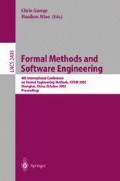Abstract
This paper presents an approach to the implementation of the abstract interpretation style of program analysis by first constructing a logic for representing the process of abstract analysis, and then embedding this logic in the theorem prover HOL. Progr ams to be analysed undergo a two-phase process, first being mechanically transformed to an analysis model, and then this being used to test or verify program properties. A specific advantage of this approach is that it allows abstract interpretation to be used in a consistent framework with other analysis methods, such as Hoare Logic or exhaustive state space analysis.
Access this chapter
Tax calculation will be finalised at checkout
Purchases are for personal use only
Preview
Unable to display preview. Download preview PDF.
References
H. Anderson. Partition theory for CHL. Internal report found at http://www.comp.nus.edu.sg/~hugh/chlproject/TheoryOfArrays.pdf, 2001.
R-J. Back and J. vonWright. Refinement Calculus A Systematic Introduction. Springer, 1998.
P. Cousot and N. Halbwachs. Automatic discovery of linear restraints among variables of a program. In Association for Computer Machinery, SIGACT/SIGPLAN Symp on Principles of Programming Languages (POPL), pages 84–97, Jan 1978.
K. Fukuda and A. Prodon. Double description method revisited. In M. Deza, R. Euler, and I. Manoussakis, editors, Combinatorics and Computer Science, volume 1120, pages 91–111. Springer-Verlag, 1996.
Michael J. C. Gordon, R. Milner, and Christopher P. Wadsworth. Edinburgh LCF: a mechanised logic of computation, volume 78 of Lecture Notes in Computer Science. Springer-Verlag Inc., New York, NY, USA, 1979.
M. J. C. Gordon and T. F. Melham. Introduction to HOL: A Theorem Proving Environment for Higher Order Logic. Cambridge University Press, 1993.
N. Heintze, J. Jaffar, and R. Voicu. A framework for analysis and verification. In Association for Computer Machinery, SIGACT/SIGPLAN Symp on Principles of Programming Languages (POPL), pages 26–39, Jan 2000.
C. A. R. Hoare. An axiomatic basis for computer programming. Communications of the ACM, 12:576–580, 1969.
C. C. Morgan. Programming from Specifications Prentice Hall International Series in Computer Science, 1994.
S. Graf and H. Saidi. Construction of abstract state graphs with PVS. In O. Grumberg, editor, Proc. 9th International Conference on Computer Aided Verification (CAV’97), volume 1254, pages 72–83. Springer Verlag, 1997.
Author information
Authors and Affiliations
Editor information
Editors and Affiliations
Rights and permissions
Copyright information
© 2002 Springer-Verlag Berlin Heidelberg
About this paper
Cite this paper
Anderson, H. (2002). Abstract Interpretation with a Theorem Prover. In: George, C., Miao, H. (eds) Formal Methods and Software Engineering. ICFEM 2002. Lecture Notes in Computer Science, vol 2495. Springer, Berlin, Heidelberg. https://doi.org/10.1007/3-540-36103-0_43
Download citation
DOI: https://doi.org/10.1007/3-540-36103-0_43
Published:
Publisher Name: Springer, Berlin, Heidelberg
Print ISBN: 978-3-540-00029-7
Online ISBN: 978-3-540-36103-9
eBook Packages: Springer Book Archive

